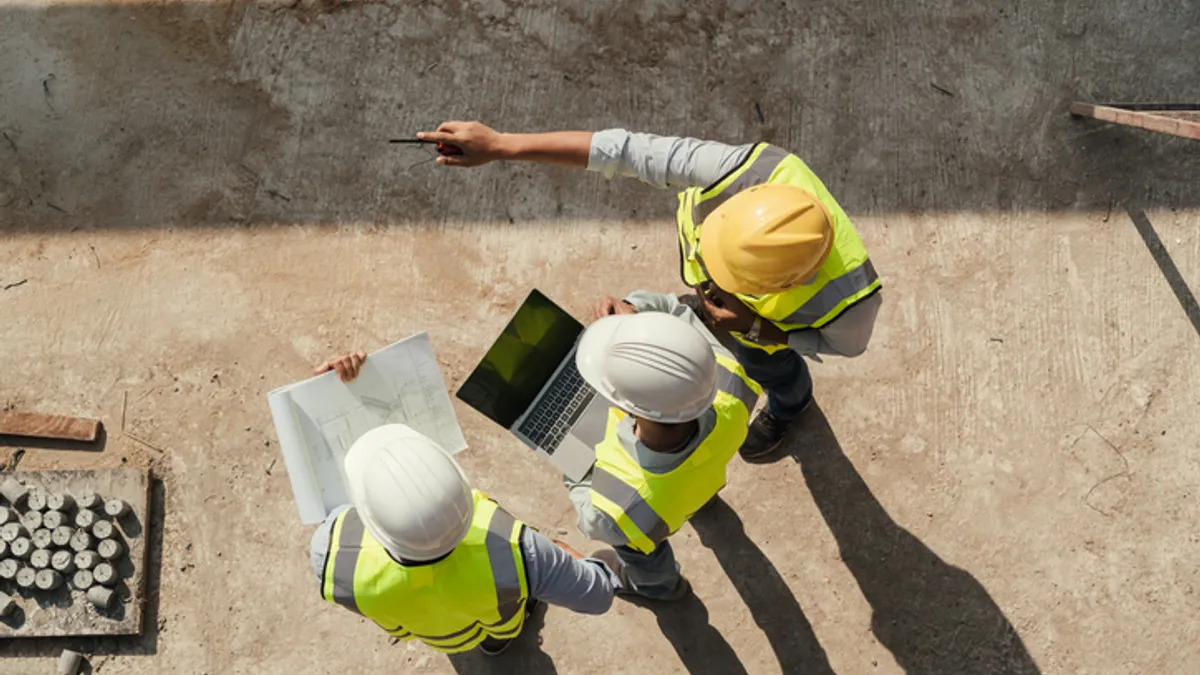Dive Brief:
- Nearly two-thirds of survey respondents described their construction companies’ artificial intelligence adoption maturity level as “average,” while 22% referred to it as “above average,” according to BuiltWorlds’ 2025 Annual AI Benchmarking Report.
- When asked if AI was a core strategic focus companywide, 35% of respondents reported that they were exploring its potential but had yet to fully embrace it, according to a news release highlighting the report. Of the respondents, 4% said, “No, AI is currently not a core strategic focus for us.”
- BuiltWorlds, a research firm headquartered in Chicago, based its data on its 2025 AI Benchmarking Survey, which featured responses from 53 individuals representing 30 organizations, BuiltWorlds told Construction Dive via email. The majority of participating organizations — 82% — were general contracting firms, and 40% of respondents generated more than $5 billion in revenue.
Dive Insight:
When asked why they were adopting AI, respondents were nearly unanimous — almost 100% of respondents said that “improving operational efficiency and productivity” was a primary driver of their work, according to the news release.
With that in mind, the report flags that companies are using AI to strengthen core business functions rather than pursue cutting-edge innovation, per the release.
However, some of these respondents — which also featured subcontractors, specialty firms and engineers — had reservations about the tech. For example, 62% cited “concerns about data privacy and security,” 58% pegged a “lack of internal expertise or skilled personnel” and a further 56% called out “limited availability or quality of data.”
Despite those hurdles, builders’ enthusiasm for AI is high, said Audrey Lynch, BuiltWorlds’ director of research and the report’s author, in the release. Meanwhile, 2% of respondents said they were “skeptical” of the tech.
“It’s important to note that these challenges likely stem from the technology’s relative immaturity and the industry’s historical resistance to widespread innovation,” Lynch said.
In addition, companies with revenue over $5 billion are 45% more likely to describe their AI maturity level as “above average” compared those with an annual revenue under $5 billion, Lynch told Construction Dive via email.
The report fits into a growing body of studies and surveys that arrive at similar conclusions — while most builders are optimistic about AI and its potential benefits, adoption remains low.
Larger contractors, however, are engaged in an AI arms race to gain an edge over their competitors. Swedish-builder Skanska and Watsonville, California-based Granite Construction, have touted their own AI offerings. Skanska’s Safety Sidekick combined its EHS Manual, OSHA construction standards and supplemental safety documentation into one platform, and Granite’s Asphalt Guru helps the contractor train its asphalt paving team with a collection of informational and safety documentation, such as DOT standards and industry articles.














